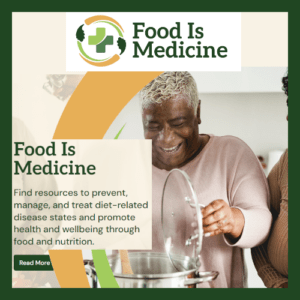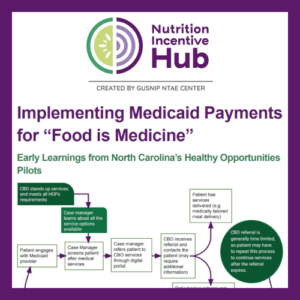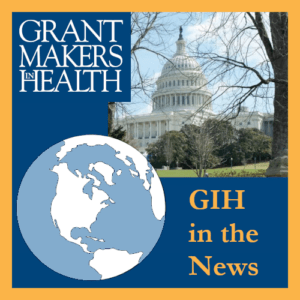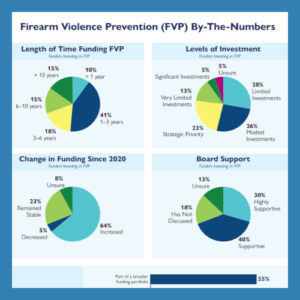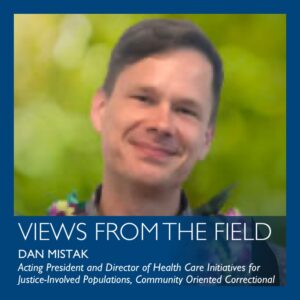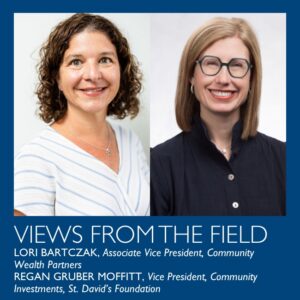Upcoming Events
Past Events
Featured Resources
New America Report Examines Subminimum Wage for Disabled Workers
Under the Fair Labor Standards Act, employers are allowed to pay disabled workers less than the federal minimum wage, which has significant impacts on these workers’ health and well-being. A report from New America examines, state by state, the policies that drive the use or elimination of the subminimum wage, as well as the programs each state provides to more comprehensively support individuals with disabilities as they seek meaningful employment and fair wages.
HHS Launches New Food is Medicine Virtual Toolkit
The Toolkit was developed in response to the National Strategy on Hunger, Nutrition, and Health and to support communities design and implement effective Food is Medicine interventions.
Case Study Examines Early Learnings in Using Medicaid Payments for Food is Medicine
A new resource commissioned by the Fair Food Network examines the early learnings from the Healthy Opportunities Pilots effort in North Carolina to use federal 1115 Medicaid Demonstration Waiver funding to scale and sustain community-based implementation of a combination of produce prescription programs, medically tailored meal programs, and nutrition education.
Explore Health Equity and Social Justice Topics
Recent Items - Climate and Environmental Health
Recent Items - Health Equity
Recent Items - Healthy Eating/Active Living
Recent Items - Housing
Marin Community Foundation: October 2024
Horizon Foundation: September 2024
Recent Items - Justice Reform
Recent Items - Social Determinants of Health
Marin Community Foundation: October 2024
Recent Items - Violence Prevention
The Joyce Foundation
Latest Resources
Humana Foundation Advances Equity Through Community-Engaged Research Practices
Grantmakers In Health’s Maya Schane spoke with Heather Hyden and Soojin Conover of the Humana Foundation about the Foundation’s recently published report, Strengthening Science and Community Impact Through Equitable Research Practices. The report examines innovative research methods adopted by the Foundation’s partners to promote health equity in public health research through community-engaged research practices.
Working Through Challenges to Sharing Power With Community: Highlights from a Session at Grantmakers in Health’s Annual Conference
The people closest to the issue best know the solutions. For health funders, sharing power with community could mean giving residents a voice in shaping your grantmaking priorities or where grant dollars are spent. Many funders understand that solutions are more likely to be successful when the people who are most affected have a voice in shaping them. But when it comes to including that voice, the work often stalls before it starts.
Remarks on Defending Philanthropy’s Freedom to Give
President and CEO of Grantmakers In Health (GIH), Cara V. James, delivered opening remarks at the 2025 GIH Annual Conference on Health Philanthropy in New Orleans.
From Recovery to Resilience: Investing in Collaborative Infrastructure for Health and Equity
After the 2018 Camp Fire – the most destructive and deadly wildfire in California’s history – the California Accountable Communities for Health Initiative (CACHI) understood that the community needed more than programming to recover. In response, the region’s Accountable Community for Health (ACH) was created – a community-rooted, cross-sector collaborative that invests in local leadership to shift systems, influence policy, and address both long-standing inequities and urgent crises.
Broken Triangle: A Framework for Reparative Philanthropic Relationships
Traditional philanthropic practices have often created imbalanced power dynamics and barriers for Black-led, Black-serving organizations. When the REACH Healthcare Foundation performed a portfolio review in 2018 that revealed this same exclusion within the foundation’s grantmaking investments, REACH committed to reshaping their funding approach, which aims to repair previously neglected —and in some cases, damaged —relationships.
Act Now to Protect Philanthropy, Medicaid, and SNAP
Right now, Congress is finalizing a massive budget reconciliation bill that threatens philanthropy’s freedom to give and endangers the health and well-being of many millions of Americans. We are reaching out today to raise awareness of three critical developments in the ongoing budget reconciliation process and to encourage you to act.
Reports and Publications
Confronting Chronic Homelessness: Health Funders Consider New Solutions
On any given day, at least 800,000 people are homeless in the United States, including about 200,000 homeless families. It is virtually impossible for most to find rental property within their means. Also, as many as 70 percent of homeless individuals struggle with serious health problems, mental and physical disabilities, or substance abuse problems.
Innovations in the Prevention and Treatment of Diabetes
One of the most deadly and disabling consequences of America’s obesity epidemic is the precipitous increase of individuals suffering from diabetes. According to estimates by the American Diabetes Association (ADA), approximately 4,110 people are diagnosed with diabetes each day, with 1.5 million new cases diagnosed in 2005. The ADA predicts that one in three Americans born in 2000 will develop diabetes during their lifetime.
Selling Healthy Lifestyles: Using Social Marketing to Promote Change and Prevent Disease
Social marketing is increasingly being applied to the promotion of healthier behaviors and the prevention of chronic diseases. This 2 page Issue Focus describes how grantmakers can use social marketing techniques to help people quit smoking or never start, eat a healthier diet, and get more exercise.
Strengthen your knowledge, skills, and capacity.
GIH focuses our programming around five areas that are critical to achieving better health for all.
We invite you to explore the resources available on our focus areas pages, browse content in more specific issue areas, and to connect with GIH staff to discuss how we can partner and support your work.


